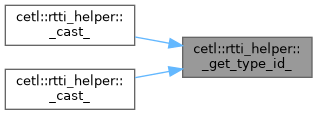#include "cetl/rtti.hpp"
Public Member Functions | |
| CETL_NODISCARD void * | _cast_ (const type_id &id) &noexcept override |
| CETL_NODISCARD const void * | _cast_ (const cetl::type_id &id) const &noexcept override |
 Public Member Functions inherited from cetl::rtti Public Member Functions inherited from cetl::rtti | |
Static Public Member Functions | |
| static constexpr type_id | _get_type_id_ () noexcept |
Non-polymorphic types that want to support RTTI should simply provide a _get_type_id_() method that returns cetl::type_id; there is no need for them to use this helper.
Polymorphic types, on the other hand, are trickier because their runtime type may not be the same as their static type; for this reason, they should either implement cetl::rtti manually, or, alternatively, publicly inherit from this helper class, which will provide the necessary implementation of the RTTI-related methods along with the aforementioned _get_type_id_ method.
This helper shall be the first base class in the inheritance list. This is because it assumes the equivalency between a pointer to itself and a pointer to the derived type, which is only guaranteed if it is the first base. This restriction could be lifted with the help of CRTP, but it could make usage a bit more complex.
If a polymorphic type inherits from other classes that also implement the cetl::rtti interface, such inheritance should be done not directly but through this helper; that is, instead of inheriting from A and B, the type should inherit from rtti_helper<A,B>. This is done to inform the helper about the type hierarchy, allowing it to perform an exhaustive search for a matching conversion throughout the entire type hierarchy tree in the presence of multiple inheritance.
Conversion to an ambiguous base class is not allowed in C++ (except for the case of virtual inheritance
| TypeIDType | The type ID encoded via cetl::type_id_type. |
| Bases | An optional list of base class that implement the cetl::rtti interface. If this helper is used, base classes that implement the cetl::rtti interface can only be inherited via this helper, not directly. If this is for whatever reason not possible, the user should implement the cetl::rtti interface manually. |
|
inlineoverridevirtualnoexcept |
The recommended implementation that performs an exhaustive search for a matching conversion throughout the entire type hierarchy tree in the presence of multiple inheritance.
Implements cetl::rtti.
References _get_type_id_(), and CETL_NODISCARD.
|
inlineoverridevirtualnoexcept |
The recommended implementation that performs an exhaustive search for a matching conversion throughout the entire type hierarchy tree in the presence of multiple inheritance.
Implements cetl::rtti.
References _get_type_id_(), and CETL_NODISCARD.
|
inlinestaticconstexprnoexcept |
The recommended implementation that simply returns the value of the TypeIDType template parameter.
References cetl::type_id_type_value().
Referenced by _cast_(), and _cast_().
